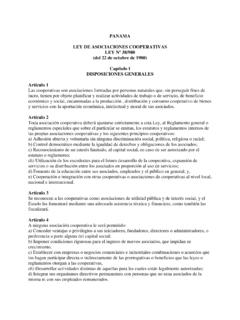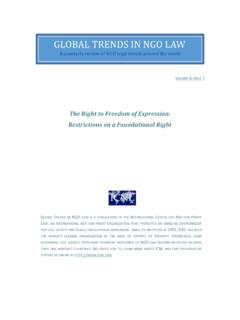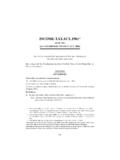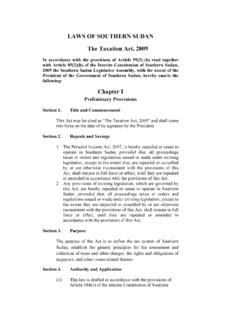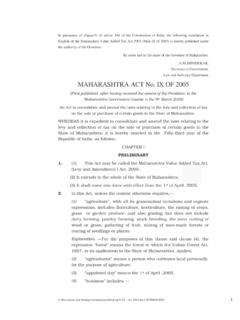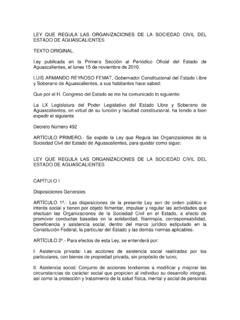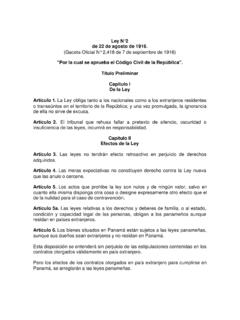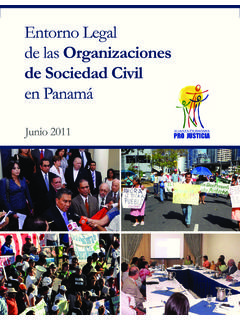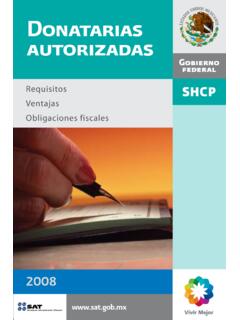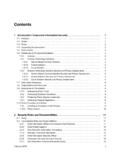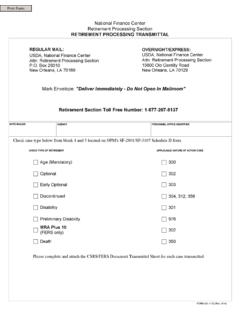Transcription of THE EMPLOYMENT ACT Cap. 226
1 EMPLOYMENT Act, cap 226 (Repealed by EMPLOYMENT Act (No 1 of 2007) LAWS OF KENYA THE EMPLOYMENT ACT Cap. 226 Published by the National Council for Law Reporting With the Authority of the Attorney-General EMPLOYMENT Act, cap 226 THE EMPLOYMENT ACT, CAP. 226 PART I-PRELIMINARY 1 Short Title and Application. 2 Interpretation. 3 Labour Advisory Board. Part II - CONDITIONS OF EMPLOYMENT 4 Payment, Disposal and Recovery of Wages, Allowances, Etc. 5 When Wages Due. 6 Deduction from Wages. 7 Leave with Full Pay. 8 Weekly Rest Day. 9 Housing. 10 Water. 11 Food. 12 Medical Attention. 13 Death of Employees. 14 Contracts of Service, General Provisions. 15 Contract Expiring on Journey may Be Prolonged. 16 Payment of Wages in Lieu of Notice. 16A Redundancy. 17 Summary Dismissal. 18 Certificate of Service. Part III - FOREIGN CONTRACTS OF SERVICE 19 Application of Part. 20 Form and Attestation Required.)
2 21 Requirements Before Attestation 22 Security in Foreign Contract of Service. 23 Offence to Induce Person to Proceed Abroad Under Informal Contract. Part IV - EMPLOYMENT OF WOMEN AND JUVENILES 24 Application and Interpretation of Part. 25 No Child to Be Employed in an Industrial Undertaking. 26 Children Not to Be Employed Otherwise Than Under Verbal Contracts. 27 Restriction on EMPLOYMENT of Children in Attendance on Machinery, Etc. 28 Restriction on EMPLOYMENT of Women and Young Persons. 29 Emergencies. 30 Restriction on EMPLOYMENT of Women in Mines. 31 Registers of Juveniles in EMPLOYMENT . 32 Medical Examination of Juvenile Employees. 33 Determination of Age. 34 Powers of Labour Officer to Cancel and Prohibit Contracts. 35 Penalty for Unlawful EMPLOYMENT of Juveniles. 36 Penalty for Unlawful EMPLOYMENT of Women. 37 Penalty in Case of Death or Injury. EMPLOYMENT Act, cap 226 Part V GENERAL 38 Records to Be Kept by Employer.
3 39 Penalty for False Entries, Etc. 40 Complaint and Jurisdiction in Cases of Dispute Between Employers and Employees. 41 Whole or Part of any Fine may Be Paid to the Complainant. 42 Defendant Not Required to Enter Dock Except in Certain Events. 43 When Civil Procedure may Be Followed. 44 Joinder in Cases of Non-payment of Wages. 45 Costs of Witnesses, Etc. 46 Offences Under Other Laws. 47 Saving as to Contracts of Service Made Abroad. 48 General Penalty. Part VI SUPPLEMENTARY 49 Certificate of Appointment. 50 Powers of Authorized Officer. 51 Powers of Medical Officer. 52 Obstructing or Hindering Officers, Etc. 53 Offences by Companies, Etc. 54 Evidence. 55 Secrecy of Information. 56 Rules. 58 Savings. 59 Transitional. Subsidiary legislation Orders Under Section 1 (2) The EMPLOYMENT (children) Rules The EMPLOYMENT (medical Treatment) Rules EMPLOYMENT Act, cap 226 THE EMPLOYMENT ACT CHAPTER 226 Commencement Date: 1976-05-03 An Act of Parliament to consolidate, with amendments, the law relating to EMPLOYMENT , and for matters incidental thereto and connected therewith Short title and application.
4 1. (1) This Act may be cited as the EMPLOYMENT Act. (2) The provisions of this Act shall not apply to - (a) the armed forces or the reserve as respectively defined in the Armed Forces Act (Cap 199); (b) the Kenya Police, the Kenya Prisons Service or the Administration Police Force; (c) the National Youth Service; or (d) such person or class of persons, such trade or industry, or such public body, as the Minister may, by order, exempt from all or any of those provisions of this Act, but subject to the foregoing shall be binding on the Government. Interpretation. 2. In this Act, except where the context otherwise requires "authorized officer" means any labour officer and such other person as shall be appointed by the Minister under this section to be an authorized officer for the purposes of this Act; "Board" means the Labour Advisory Board established under section 3; "casual employee" means an individual the terms of whose engagement provide for his payment at the end of each day and who is not engaged for a longer period than twenty-four hours at a time: "child" means an individual, male or female, who has not attained the age of sixteen years.
5 "contract of service" means an agreement, whether oral or in writing, and whether expressed or implied, to employ or to serve as an employee for any period of time, and includes a contract of apprenticeship and indentured learnership but does not include a foreign contract of service to which Part III of this Act applies; "employee" means an individual employed for wages or salary and includes an apprentice and an indentured learner; EMPLOYMENT Act, cap 226 "employer" means any person, or public body or any firm, corporation or company, who or which has entered into a contract of service to employ any individual, and includes the agent, foreman, manager or factor of such person, public body, firm, corporation or company; "juvenile" means a child or young person; "labour inspector" means a person appointed to the public service as a senior labour inspector, a labour inspector, an industrial relations assistant or a wages inspector; "labour officer" means a person appointed to the public service as the Labour Commissioner, a deputy labour commissioner, an assistant labour commissioner, the Chief Industrial Relations Officer, the Deputy Chief Industrial Relations Officer, a senior labour officer, an industrial relations officer or a labour officer; "medical officer" means (a) a medical practitioner registered under the Medical Practitioners and Dentists Act; (b) a person licensed under section 13 of the Medical Practitioners and Dentists Act; (c) the medical officer of health of any local authority for the purposes of the Public Health Act.
6 "piece work" means any work the pay for which is estimated by the amount of work performed irrespective of the time occupied in its performance; "task" means such amount of work as can, in the opinion of an authorized officer, be performed by an employee in an ordinary working day; "woman" means a female of the age of eighteen years or above; "young person'' means an individual, male or female, who has attained the age of sixteen years but has not attained the age of eighteen years. Labour Advisory Board. 3. (1) There shall be a Labour Advisory Board whose duty it shall be to advise the Minister upon such matters connected with EMPLOYMENT and labour as the Board think fit, and upon any questions referred to the Board by the Minister. (2) The members of the Board shall be appointed by the Minister, and the Minister shall appoint a member to be chairman thereof and shall appoint an officer of the Labour Department to be secretary thereof.
7 (3) The following provisions shall have effect with respect to the constitution and proceedings of the Board - (a) the Minister may at any time cancel the appointment of a member of the Board; and, unless his appointment is so cancelled, each member of the Board shall hold office for three years; EMPLOYMENT Act, cap 226 (b) if the chairman of the Board ceases to be a member of the Board, he shall also cease to be chairman of the Board; (c) any member of the Board, including the chairman, may, by notice in writing addressed to the Minister, resign his membership, and the chairman may, by the like notice, resign his office as such; (d) a member of the Board who ceases to be a member or who ceases to be a chairman shall be eligible for reappointment; (e) there shall be paid out of moneys provided by Parliament to the members of the Board, including the chairman, in respect of their office as such, such reasonable allowances in respect of expenses properly incurred in the performance of their duties as may be determined by the Minister with the consent of Minister for the time being responsible for finance; (f) the quorum of the Board and the arrangements relating to its meetings shall, subject to any directions given by the Minister, be such as the Board may determine.
8 Payment, disposal and recovery of wages, allowances, etc. 4. (1) Subject to this Act, the entire amount of the wages earned by or payable to an employee in respect of work done by him in pursuance of a contract of service shall be paid to him directly in the currency of Kenya: Provided that if an employee so requests in writing, or if the provisions of an agreement made between a trade union and an employer or organization of employers which relates to terms and conditions of EMPLOYMENT applicable to him so provide, payment may be made - (a) into an account at a bank, or building society, in his name whether alone or jointly with any other individual; or (b) by cheque, postal order or money order; and (c) in the absence of an employee, to a person other than the employee, if the person is duly authorized by him in writing to receive the wages on his behalf. (2) Payment of wages shall be made on a working day, and during working hours, at or near to the place of EMPLOYMENT or at such other place as may be agreed to between the employer and the employee.
9 (3) Payment of wages shall not be made in any place wherein intoxicating liquor is sold or readily available for supply, except in the case of employees employed to work therein. (4) No person shall give or promise to any individual any advance of money or any valuable consideration upon a condition expressed or implied that the individual or any dependant of his shall enter upon any EMPLOYMENT . (5) If, in a contract of service or collective agreement, provision is made for the payment of any allowance in kind to an employee with his consent, the payment may with such consent be made if, and only if, the allowance - EMPLOYMENT Act, cap 226 (a) is for the personal use and benefit of the employee himself; and (b) does not consist of or include any intoxicating spirit or noxious drug. (6) Notwithstanding the provisions of any law for the time being in force, whenever an attachment has been issued against the property of an employer in execution of a decree against him, the proceeds realized in pursuance of that execution shall not be paid by the court to a decree-holder until a decree obtained against the employer in respect of the wages of his employees has been satisfied to the extent of a sum not exceeding four months' wages of those employees: Provided that nothing in this subsection shall prevent an employee from recovering any balance due on the last mentioned decree, after such satisfaction as aforesaid, by ordinary process of law.
10 (7) If an employer advances to an employee a sum in excess of the amount of one month's wages of the employee or, in the case of an employee employed under a written contract of service, a sum in excess of the amount of two months' wages of that employee, the excess shall not be recoverable in a court of law. (8) A person who - (a) subject to section 6, wilfully fails to make payment of or to tender the wages earned by or payable to an employee in accordance with subsection (1); or (b) contravenes any of the provisions of subsections (2), (3), (4) and (5), shall be guilty of an offence. (9) No employer shall limit or attempt to limit the right of an employee to dispose of his wages in a manner which he deems fit, nor by any contract of service or otherwise seek to compel an employee to dispose of his wages or a portion thereof in a particular place or for a particular purpose in which the employer has a beneficial interest whether direct or indirect.

